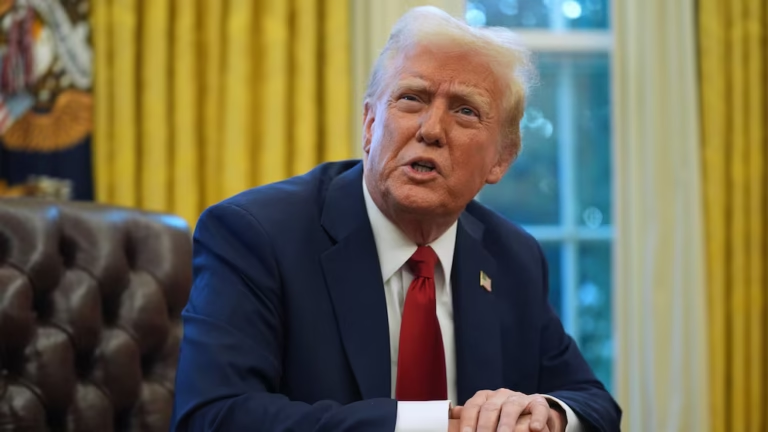President Trump signed executive orders Saturday, imposing 25% taxes on most imports from two of the country’s biggest trading partners: Canada and Mexico. Goods from China will be charged a 10% tax.
The tariffs take effect on Tuesday.
Trump said in a social media post he’s taking the action in an effort to address the illegal flow of drugs and immigrants across the United States’ northern and southern borders.
Canadian crude oil will be subject to a lower, 10% tariff, which could mitigate the effect on U.S. gasoline prices. Midwestern oil refineries are heavily dependent on Canadian crude.
Business groups started to react immediately after the announcement. A trade group representing the liquor industry said the tariffs would hurt jobs.
“Since the 1990s, trade in spirits in North America has been largely tariff-free, resulting in significant growth. U.S.-Canada trade in spirits increased by 147%, while U.S.-Mexico trade surged by 4,080%,” according to a joint statement by the Distilled Spirits Council of the U.S., the Chamber of the Tequila Industry, and Spirits Canada.
The group said that the products are distinctive to each country and the tariffs would hurt the domestic industries. Bourbon and Tennessee Whiskey can only be made in the U.S., Tequila in Mexico, and Canadian Whisky in Canada.
On Sunday, in coordinated statements from China’s foreign ministry and commerce ministry, Beijing denounced the tariffs and said China would take unspecified “corresponding countermeasures.” The commerce ministry said the tariffs were a serious violation of World Trade Organization rules, and said it would launch a legal challenge at the WTO. The foreign ministry said China has taken steps to help the U.S. deal with fentanyl, which it said was ultimately a U.S. problem, and said the imposition of tariffs “will inevitably affect and undermine future cooperation between the two sides on anti-drug issues.”
Some individual shoppers also tried to beat the tariffs. Personal spending on durable goods such as autos and televisions jumped in December, according to figures released Friday by the Commerce Department. Mexico is a leading producer of flat-screen TVs
Tariffs have come up more than 200 times on corporate earnings calls this month.
The auto industry is expected to be particularly hard hit because it is highly integrated, relying on manufacturing in all three countries.
General Motors told financial analysts on Tuesday that it could shift some pickup truck production out of Mexico and Canada if tariffs are imposed. But the automaker is reluctant to act while the trade landscape is still uncertain.
“We are prepared to mitigate near-term impacts,” said CEO Mary Barra. “What we won’t do is spend [a] large amount of capital without clarity.”

